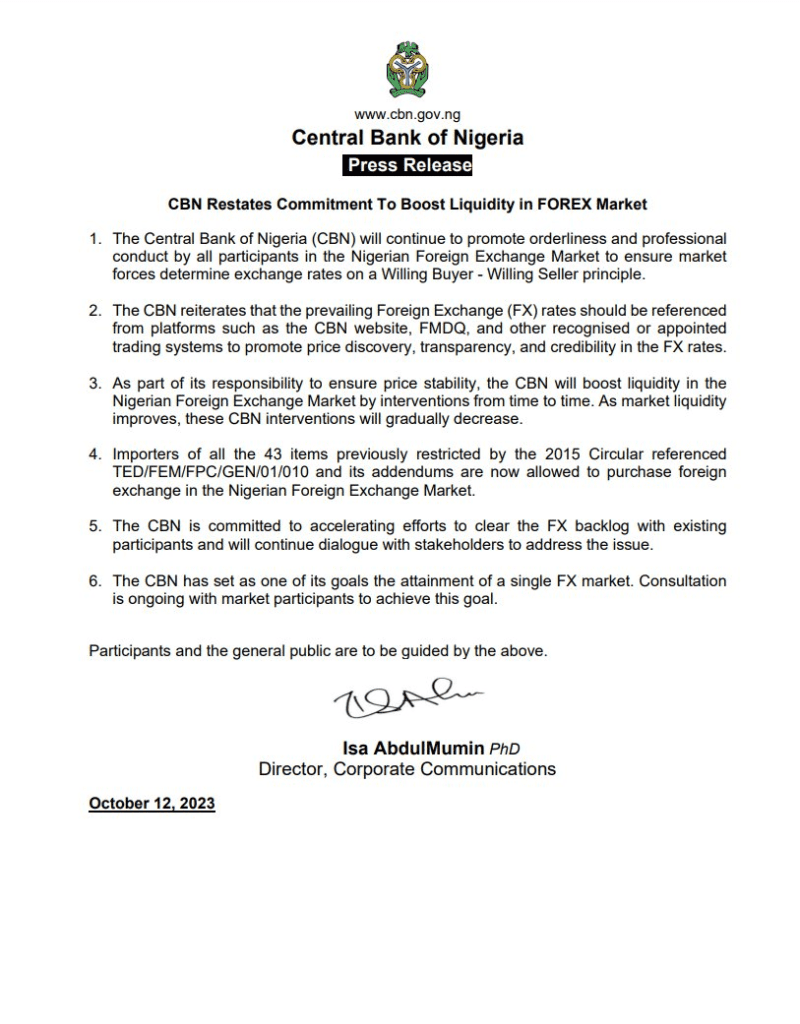Business
CBN lifts the forex ban on 43 items in order to intervene in the forex market

The limitations on foreign exchange that the Central Bank of Nigeria (CBN) imposed on importers of 43 commodities eight years ago have finally been abolished.
“The creation of a single FX market is one of the CBN’s objectives.
To accomplish this purpose, regular consultation with market players is taking place. The Central Bank of Nigeria (CBN) announced the lifting of the 43-item forex embargo and made a commitment to occasionally engage in the FX market.
The items were prohibited from getting FX from the I&E window by the apex bank in 2015 because they were “not valid for foreign exchange and could be produced in the country.”
Among the products affected include rice, cement, palm kernels, meat and meat products, poultry, soap, and cosmetics.
Isa AbdulMumin, the bank’s director of corporate communications, however, said in a statement that the embargo had been lifted.
“The CBN would occasionally intervene in the Nigerian Foreign Exchange Market to increase liquidity as part of its duty to ensure price stability.
These CBN interventions would gradually decline as market liquidity increases, according to the statement released on Thursday.
Importers of all 43 items that were previously prohibited by the 2015 Circular TED/FEMFPC/GEN/O1/010 and its addenda are now permitted to buy foreign currency on the Nigerian Foreign Exchange Market.
READ ALSO: Lemo advises CBN to clear the forex backlog to increase naira confidence
“The Central Bank of Nigeria (CBN) will continue to promote orderliness and professional conduct by all participants in the Nigerian Foreign Exchange Market to ensure market forces determine exchange rates on a Willing Buyer-Willing Seller principle,” he continued.
“The CBN reiterates that in order to encourage price discovery, transparency, and credibility in the FX rates, the current Foreign Exchange (FX) rates should be referred to from platforms such the CBN website, FMDCQ, and other recognised or authorised trading systems.
“The CBN would occasionally intervene in the Nigerian Foreign Exchange Market to increase liquidity as part of its duty to ensure price stability.
The CBN will gradually scale back its involvement as market liquidity increases. “The creation of a single FX market is one of the CBN’s objectives. To do this, market participants are currently being consulted, according to CBN.
The 43 things are as follows:
Rice
Cement
Margarine
Palm kernel
Palm oil products
Vegetable oils
Meat and processed meat products
Vegetables and processed vegetable products
Poultry and processed poultry products
Tinned fish in sauce (Geisha)/sardine
Cold rolled steel sheets
Galvanized steel sheets
Roofing sheets
Wheelbarrows
Head pans
Metal boxes and containers
Enamelware
Steel drums
Steel pipes
Wire rods (deformed and not deformed)
Iron rods
Reinforcing bars
Wire mesh
Steel nails
Security and razor fencing and poles
Wood particle boards and panels
Wood fiberboards and panels
Plywood boards and panels
Wooden doors
Toothpicks
Glass and glassware
Kitchen utensils
Tableware
Tiles-vitrified and ceramic
Gas cylinders
Woven fabrics
Clothes
Plastic and rubber products
Polypropylene granules
Cellophane wrappers and bags
Soap and cosmetics
Tomatoes/tomato pastes
Eurobond/foreign currency bond/ share purchases.

